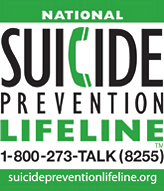Suicide Prevention
If you or someone you know is contemplating suicide, don't wait to call this 24 hour hotline: 972-883-8255.
You may also contact the National Suicide Prevention Lifeline at 1-800-273-TALK (8255).
Are You Suicidal?
- You need to know people do get through this—even people who feel as badly as you.
- You can survive suicidal feelings if you find a way to reduce your pain or increase your coping resources. Both are possible.
- Some people will react negatively to your suicidal feelings, either because they are frightened or angry. Their reactions are about their fears, not you.
- There are people who can help you in this horrible time, who will not judge, argue or try to talk you out of how badly you feel.
- Give yourself some distance. Say to yourself “I will wait 24 hours and talk to someone before I do anything.”
- Don’t give yourself the additional burden of trying to deal with this alone. Sharing your experiences may help you regain your balance.
Signs of Suicide
- Talking about suicide
- Always talking or thinking about death
- Making comments about being hopeless or worthless
- Losing interest in things one used to care about
- Visiting or calling people to say goodbye
- Putting affairs in order, tying up loose ends, changing a will
- Speaking and/or moving with unusual speed or slowness
- Excessive drug and/or alcohol use
- Poor concentration or indecisiveness
- Change in weight or appetite
- Extreme Anxiety or agitation
- Engaging in risky behavior
- Trouble or excessive sleeping
- Neglect of physical health
How to Help a Friend
- Be aware of the warning signs such as someone saying that they "just can't deal with everything" or "life isn't worth living," and/or someone giving away their personal items.
- Take the warning signs seriously. 70% of people give warning of their intentions to a friend or family members.
- Be a good listener. Don't try to interject or downplay what your friend is saying or feeling.
- Ask about their suicide plan. Don't try to change their mind. Let them know that you have heard them and that you are there for them and understand what they are going through.
- Encourage your friend to seek help from a health care provider. Don't let your friend devalue their own feelings. If they won't/don't seek help, then seek it for them before it is too late.
Suicide Statistics
- Suicide is the second leading cause of death among college-aged students
- The number one cause of suicide among all age groups is untreated depression
- More teenagers and young adults die from suicide than from cancer, heart disease, AIDS, birth defects, stroke, pneumonia, influenza, and chronic lung disease COMBINED
- Every 17 minutes another American dies by suicide, every day 86 Americans take their own life and another 1500 attempt suicide
- For every suicide death there are 5 hospitalizations and 22 Emergency Room visits for suicidal behaviors-over 670,000 visits per year
- Firearms are used in 6 of every 10 suicides
- Suicide rates remain highest among Americans 65 and older
- For all Americans, suicide is the 8th leading cause of death


